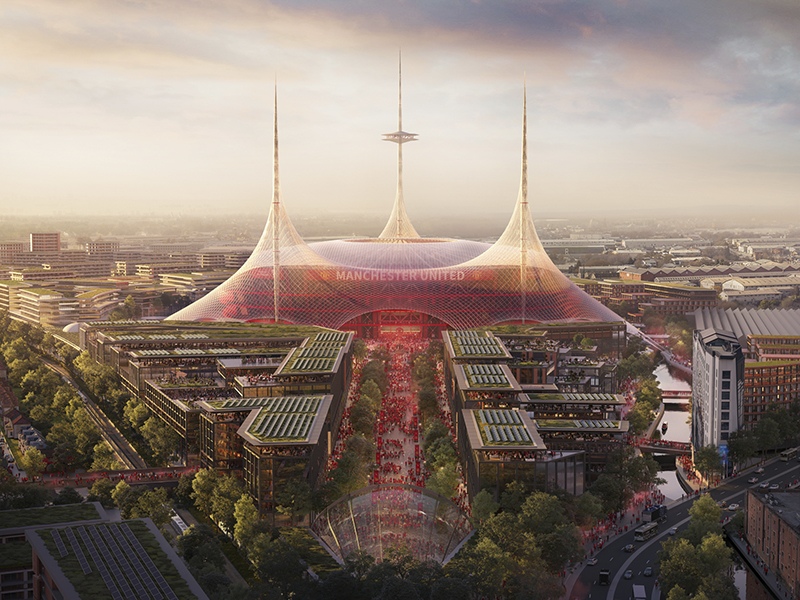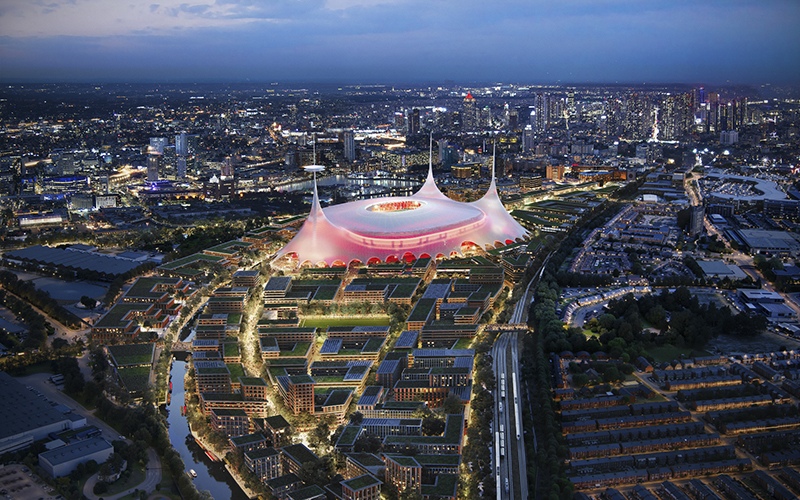
Reimagining a Legacy: Foster + Partners Presents Vision for New Manchester United Stadium
In September 2024, Manchester United, the world’s most storied football club, unveiled an audacious vision for the future of its hallowed Old Trafford Stadium District. Appointing the globally revered architectural firm Foster + Partners, the club has set out to redefine not just its iconic home but the very fabric of its surrounding community. Led by Lord Norman Foster, this masterplan transcends the boundaries of a mere stadium upgrade—it aspires to craft a world-class football destination, a vibrant mixed-use urban quarter, and a beacon of sustainable regeneration that could resonate far beyond Manchester’s skyline.
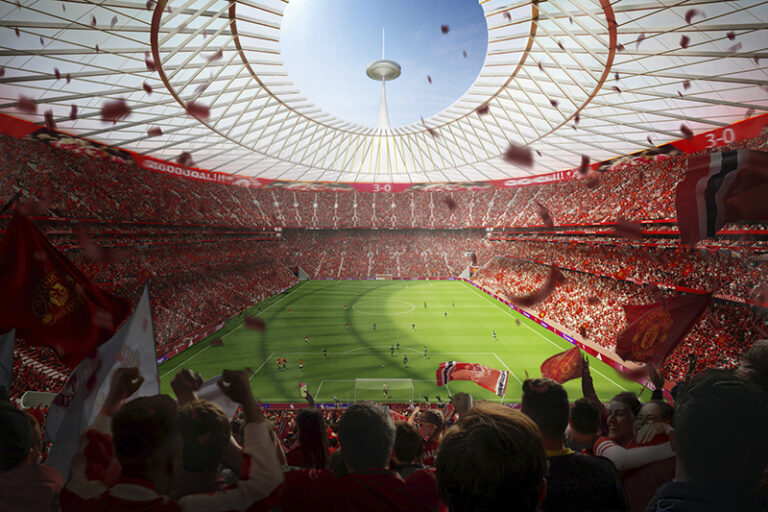
A Stadium at the Heart of Renewal
At the core of this ambitious endeavor lies a reimagined Old Trafford: a landmark stadium designed to elevate the fan experience while catalyzing social and economic transformation. The illustrative concepts, unveiled alongside the broader masterplan, depict a 100,000-seater arena that inverts traditional stadium design. Rather than an insular fortress, Foster + Partners envisions an outward-facing structure, its wraparound balconies offering sweeping views of a revitalized district. Three towering masts—evoking the trident of Manchester United’s Red Devils emblem—pierce the sky, supporting a vast, translucent canopy. This “umbrella” not only shelters fans but harvests rainwater and energy, embodying a commitment to sustainability that feels both futuristic and deeply rooted in Manchester’s industrious heritage.
Lord Foster describes the project as “one of the most exciting in the world today,” and it’s easy to see why. The stadium’s design prioritizes the visceral thrill of the matchday experience, bringing fans closer to the pitch than ever before and engineering acoustics to amplify the legendary “huge roar” of the Stretford End. Yet its ambition extends outward: the canopy envelops a public plaza twice the size of Trafalgar Square, a dynamic space poised to host interactive fan experiences, community events, and global visitors drawn to this new Mancunian landmark.
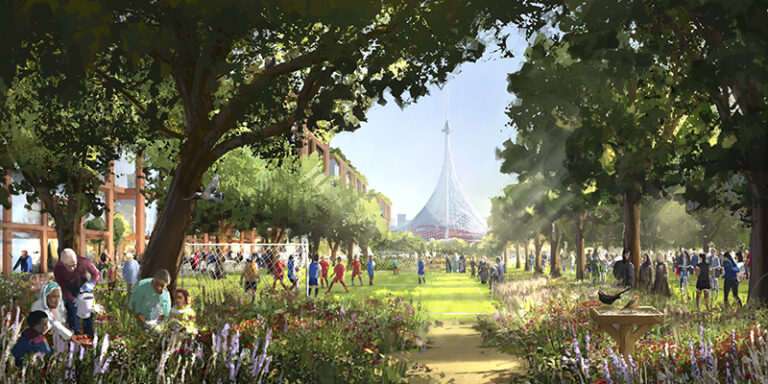
A Miniature City of Tomorrow
Beyond the stadium, the masterplan envisions a thriving, walkable district spanning one million square meters of reclaimed brownfield land. This “miniature city of the future,” as Foster calls it, blends residential, commercial, and recreational spaces with a network of green civic areas, pedestrian bridges, and waterfront promenades along the adjacent Bridgewater Canal. Public transport anchors the development, with a new train station feeding a processional route to the plaza—a nod to the ceremonial grandeur of football’s pilgrimage-like traditions.
Sir Jim Ratcliffe, co-owner of Manchester United, underscores the dual purpose of this vision: preserving the essence of Old Trafford, which has stood as the club’s beating heart for 115 years, while propelling it into the vanguard of global arenas. “Our current stadium has fallen behind the best in world sport,” he admits, but the solution is not demolition—it’s evolution. By building adjacent to the existing site, the project retains its historic soul while unlocking a state-of-the-art facility mere footsteps away. More crucially, Ratcliffe sees it as a lever for renewal, promising jobs, investment, and lasting economic vitality for a region long overdue for such a catalyst.
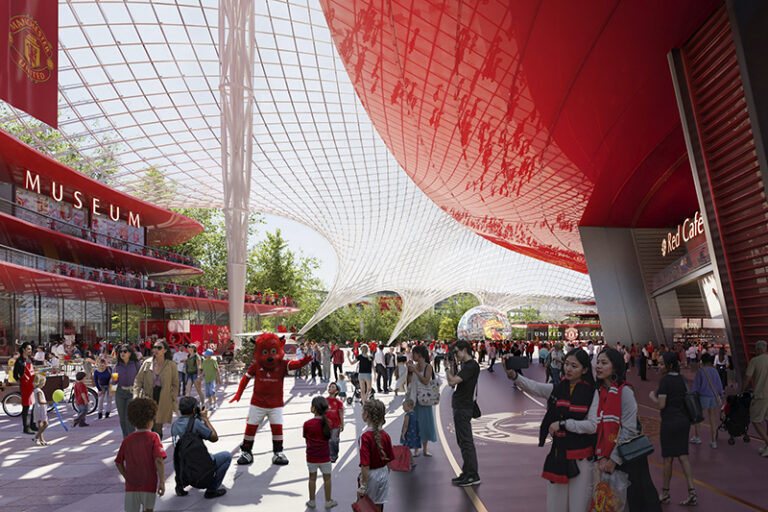
Innovation Meets Heritage
The design’s sophistication lies in its fusion of cutting-edge technology and Manchester’s storied past. Nigel Dancey, Head of Studio at Foster + Partners, highlights the trident-inspired masts as a celebration of the club’s “unique and extraordinary history,” while the use of modular prefabrication and the Manchester Ship Canal for construction nods to the city’s legacy of innovation. This approach promises to accelerate the build process, potentially setting a new benchmark for stadium projects worldwide.
Sustainability is woven into the project’s DNA. The canopy’s rainwater collection and renewable energy systems align with a broader ecological ethos, while the potential rerouting of freight from the Trafford Park terminal could ease pressure on the West Coast Main Line, boosting passenger rail capacity across the north-west. Andy Burnham, Mayor of Greater Manchester, sees this as a cornerstone of the region’s 10-year growth plan, linking government, local councils, and the club in a rare alignment of purpose. “We can unlock huge benefits for the whole of the north-west,” he asserts, envisioning a ripple effect of improved transport, housing, and amenities.

A Global Destination, A Local Legacy
For Manchester United’s 1.1 billion global fans, the new Old Trafford promises an unrivaled matchday immersion—an intimate bowl where proximity to the action amplifies every chant and cheer. Yet its significance transcends football. This is a project of national import, as Ratcliffe notes, aligning with the UK government’s push for northern infrastructure investment. It’s also a love letter to Manchester—a city whose industrial might and cultural resilience are mirrored in the verticality of the masts and the openness of the plaza.
As Foster + Partners moves into the next phase of feasibility and consultation, the Old Trafford Stadium District stands poised to redefine what a sports-led regeneration can achieve. It’s a bold synthesis of heritage and futurism, community and ambition, local pride and global allure. In Lord Foster’s words, it’s a district “Mancunians can be proud of”—and, if realized, a testament to the power of architecture to transform not just a place, but the spirit of those who call it home.
